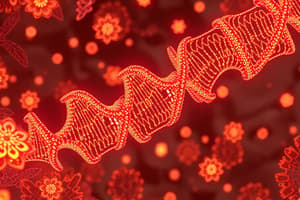Podcast
Questions and Answers
What is UV light?
What is UV light?
UV light is a type of electromagnetic radiation with shorter wavelengths than visible light.
What is the range of wavelengths for UV light?
What is the range of wavelengths for UV light?
UV light has wavelengths between 10 and 400 nanometers (nm).
What are some applications of UV light?
What are some applications of UV light?
UV light is used in medicine, industry, and by the body to produce vitamin D.
What is the definition of ultraviolet waves?
What is the definition of ultraviolet waves?
What are the three categories of ultraviolet waves based on wavelength?
What are the three categories of ultraviolet waves based on wavelength?
What are some uses of ultraviolet waves?
What are some uses of ultraviolet waves?
What are the three subcategories of UV light and their respective wavelengths?
What are the three subcategories of UV light and their respective wavelengths?
What are the environmental and biological effects of UV-B light?
What are the environmental and biological effects of UV-B light?
Which types of UV light make it to the Earth's surface?
Which types of UV light make it to the Earth's surface?
Name some artificial sources of UV light.
Name some artificial sources of UV light.
Flashcards are hidden until you start studying
Study Notes
Ultraviolet Light Basics
- Ultraviolet (UV) light is a type of electromagnetic radiation with shorter wavelengths than visible light.
- UV light has a higher frequency than visible light and is categorized as electromagnetic radiation with wavelengths between 10 and 400 nanometers (nm).
- Electromagnetic radiation consists of waves of electric and magnetic fields that propagate through space.
- UV light is a form of electromagnetic radiation that can travel through space without a medium.
Wavelength and Frequency of UV Light
- UV light has shorter wavelengths than visible light, meaning it has higher energy.
- The wavelength of UV light ranges from 10 to 400 nm.
- UV light can be divided into smaller sections with different effects, including long-wavelength UV (UV-A) and short-wavelength UV (UV-B and UV-C).
Effects of UV Light
- Long-wavelength UV (UV-A) can be beneficial, while short-wavelength UV (UV-B and UV-C) can be harmful.
- UV light can cause DNA damage and lead to the development of skin cancers.
- UV light can also cause damage to the eyes, including retinal burns and cataracts.
Types of UV Light
- UV-A (320-400 nm) has the longest wavelength and lowest energy.
- UV-B (290-320 nm) has shorter wavelengths than UV-A and has both beneficial and harmful effects.
- UV-C (220-290 nm), far UV (190-220 nm), and vacuum UV (40-190 nm) all have sufficient energy to cause more significant damage to DNA.
Uses and Dangers of UV Light
- UV light has both beneficial and harmful effects, and is used in various applications, including medicine and industry.
- UV light is used in fluorescent dyes, crime scene investigating, water and food sterilization, and research science.
- However, excess sun exposure can cause sunburn, damage collagen and vitamin A in the skin, and lead to the development of skin cancers.
Sources of UV Light
- The Sun is the largest source of UV light, emitting UV light at all wavelengths.
- Artificial sources of UV light include tanning beds, arc lights, diodes, and lasers.
- Black lights, UV light-emitting diodes (LEDs), and germicide lamps are also common sources of UV light.
Studying That Suits You
Use AI to generate personalized quizzes and flashcards to suit your learning preferences.




